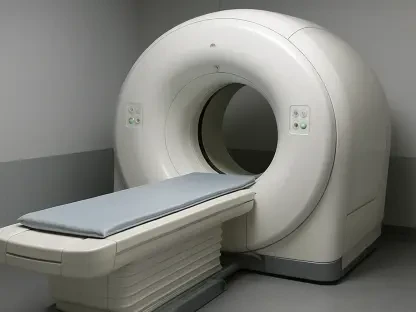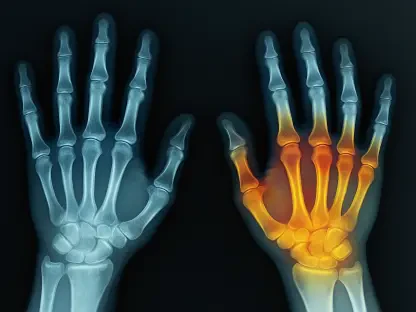A groundbreaking stride in Alzheimer’s diagnostics has taken center stage with the U.S. Food and Drug Administration’s recent clearance of a non-invasive blood test designed to detect early signs of the disease. Developed by Fujirebio Diagnostics, this test evaluates specific biomarkers in blood samples, facilitating the early detection of amyloid plaques that characterize Alzheimer’s. Such advancements are poised to redefine current diagnostic protocols by offering a practical and less intrusive alternative. The implications are significant, easing the traditional reliance on more invasive methods like lumbar punctures or costly PET scans while broadening accessibility for patients and healthcare professionals.
Revolutionizing Diagnostic Methods
For years, the diagnosis of Alzheimer’s disease heavily relied on techniques like PET scans or cerebrospinal fluid tests, both targeting amyloid plaque presence in the brain. PET scans, although effective, are prohibitively expensive and often inaccessible for many patients, creating barriers in early diagnosis. Conversely, cerebrospinal fluid tests require lumbar punctures—a procedure that is not only invasive but also comes with discomfort and logistical challenges that mandate specialist equipment and environments. These limitations have fueled demand in the healthcare sector for less invasive diagnostic alternatives that could reach a broader demographic of patients.
The introduction of Fujirebio’s blood test as an alternative signifies a potential paradigm shift in diagnosing cognitive impairments linked with Alzheimer’s. This test has been shown to offer an equivalency to traditional methods without the associated drawbacks of the former invasive procedures. The FDA’s endorsement underscores a transition to a more patient-friendly diagnostic pathway, setting a new precedent where blood tests become primary screening tools. Such approvals hint at a future where these blood tests might precede more invasive diagnostics in clinical settings, offering a more accessible entry point for early therapeutic interventions.
The Science Behind the Test
Fujirebio’s breakthrough diagnostic tool focuses on measuring the plasma ratio of two proteins: pTau217 and beta-amyloid 1-42. These proteins are pivotal in identifying amyloid plaques in the brain, a hallmark in the pathology of Alzheimer’s. Validation of the test results arose from a multi-center clinical trial involving 499 plasma samples from individuals with cognitive impairments. This robust study revealed the test’s impressive accuracy, correctly identifying 91.7% of individuals with amyloid plaques as confirmed by PET scans or CSF tests. Furthermore, of those who tested negative through this blood test, an overwhelming 97.3% were corroborated as plaque-free upon subsequent evaluations, attesting to the test’s reliability.
Notably, only a minor fraction of participants—less than 20%—received indeterminate results, which highlights the test’s efficacy in providing clear outcomes. Despite its promise, the blood test does not serve as a conclusive diagnostic measure on its own. Healthcare practitioners are expected to interpret these results alongside other clinical assessments and diagnostic modalities, ensuring a comprehensive analysis of a patient’s condition. This integrated approach minimizes misdiagnosis risks and promotes accurate treatment planning.
Industry Response and Future Implications
The dawn of this blood test coincides with a burgeoning interest within the pharmaceutical sector. The development of disease-modifying drugs, including Eisai and Biogen’s Leqembi and Eli Lilly’s Kisunla, underscores the demand for precise and early Alzheimer’s diagnostics. Integrating this blood test complements these new treatment avenues, potentially allowing for earlier interventions in the therapeutic regime. By facilitating a quicker and more precise diagnostic journey, this test could enhance patient outcomes significantly.
The broader public health scene reveals a pressing need for such advancements. Predictions indicate that Alzheimer’s prevalence may double by the end of the decade, stressing the urgency for effective and accessible diagnostic technologies. Innovations like Fujirebio’s test are critical in empowering the healthcare community to tackle these impending challenges. Pharmaceutical companies anticipate leveraging regulatory approvals, Medicare reimbursements, and evolving clinical guidelines to embed blood-based diagnostics into routine practice. Such steps promise a more streamlined approach to detecting and managing Alzheimer’s disease, making early diagnosis more attainable in standard healthcare.
A New Era in Alzheimer’s Diagnostics
The recent approval of a revolutionary blood test by the U.S. Food and Drug Administration marks a significant leap forward in Alzheimer’s diagnostics. Developed by Fujirebio Diagnostics, this innovative test offers a non-invasive way to detect the early stages of Alzheimer’s by analyzing specific biomarkers found in blood samples. This development is set to transform current diagnostic approaches, providing a more practical and less invasive alternative to traditional methods. Until now, doctors have relied on lumbar punctures or expensive PET scans to identify the amyloid plaques linked with Alzheimer’s, both of which are more intrusive and less accessible. The new test holds the potential to not only simplify the diagnostic process but also make it more widely available, thus easing access for both patients and healthcare professionals. By focusing on early detection, this test plays a crucial role in opening new avenues for treatment and research, potentially altering the future landscape of Alzheimer’s care and management.









